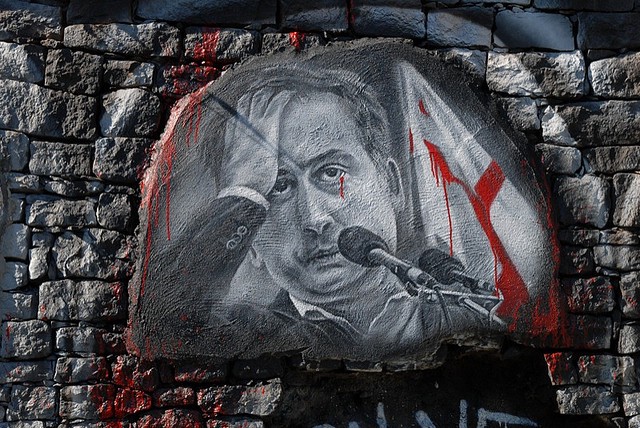How to Be an Ex-President

September, 2014:
At the Smorgasburg food fair in Williamsburg, Brooklyn, Mikheil Saakashvili motored in fluorescent green sneakers among bearded men with tattoos and women in revealing overalls. They lined up for Cheese Pops, Dun-Well Doughnuts and other local delicacies. He ordered a coconut. … Mr. Saakashvili is in self-imposed exile on North Seventh Street — plotting a triumphant return, even as his steep fall from grace serves as a cautionary tale to the many American government officials who had hoped he would be a model exporter of democracy to former Soviet republics.
Since leaving office last November, this George W. Bush favorite — whose confrontation with President Vladimir V. Putin of Russia led to a disastrous war in 2008 — has commandeered his uncle’s apartment in a tower on the Williamsburg waterfront, where he luxuriates in the neighborhood’s time-honored tradition of mysteriously sourced wealth. When not lingering in cafes, riding his bike across the bridge or spending stag evenings with friends on the Wythe Hotel rooftop, Mr. Saakashvili seizes on the Ukrainian conflict and his experience with Mr. Putin’s wrath as a lifeline back to political relevance.

April, 2009:
Unfortunately for Mr. Saakashvili, the opposition recently happened upon a virtual gold mine of material for their campaign on the racy personal blog of a female American massage therapist, who flew to Georgia to treat him in February.
The masseuse is named Dorothy Stein, but she goes by the nickname one of her many famous clients, Frank Zappa, gave her years ago: Dr. Dot. As she explained in a VH1 profile some years ago, her massage career began at the age of 14 when she offered to give members of the rock band Def Leppard back rubs as a way of getting to hang around with her idols backstage. With that early start, she set about compiling the impressive list of “satisfied customers” on her professional Web site, which now includes hundreds of famous rock stars and celebrities — like the Rolling Stones, Sting, Mariah Carey, Russel Crowe, Jay-Z, Juliette Lewis (who could play her in a biopic), Lauryn Hill, Ice-T, Eros Ramazotti and Bruce Willis, for starters.
It is not clear exactly when Dr. Dot added her most unusual massage technique — biting her clients backs — to her arsenal, but that certainly attracted the attention of Russia Today, the state-supported satellite channel that deals with Mr. Saakashvili roughly the way Fox News dealt with President Bill Clinton in the late 1990s

November, 2008:
Thousands of antigovernment demonstrators poured into the streets of Georgia’s capital, Tbilisi, on Friday, hoping to weaken the government of President Mikheil Saakashvili as it strives to maintain power despite a catastrophic war with Russia and a growing economic malaise at home.
The large, though generally subdued, demonstration occurred one year after black-helmeted riot police officers violently quashed opposition protests in Tbilisi, pelting unarmed civilians with clubs and rubber bullets, and using tear gas and water cannons to chase the protesters from the streets.
That event roused accusations domestically and internationally that the president’s promises of democracy and reform, which he made upon taking power in a bloodless coup in 2003, had fallen short, leaving Georgia only slightly more democratic than the country’s post-Soviet neighbors, including Azerbaijan, Armenia and Russia.

November, 2007
Mr. Saakashvili’s surprise announcement marked an effort to alleviate the domestic unrest and international concern after the police action in Tbilisi, the country’s capital, and the suspension of civil liberties. The president also said that the state of emergency would end soon, although he did say when.
More than 500 people were injured in the crackdown and clashes, none of them fatally, the government said. In the aftermath, public assembly was banned by Mr. Saakashvili’s emergency order and two opposition television stations were forced off the air.
One of the stations, Imedi-TV, carried the country’s most popular news programs; it was occupied by special forces officers. The government accused it of inciting unrest after it broadcast a statement from one of its owners, Badri Patarkatsishvili, calling for the end of Mr. Saakashvili’s government.

February 2004:
SOON after taking power in a pro-Western uprising in Georgia, President Mikheil Saakashvili journeyed in February 2004 to Moscow, his country’s former taskmaster, for his first talks with Vladimir V. Putin.
Here would be the climactic face-off: on one side, a young and impulsive modernizer who fancied himself leader of so-called color revolutions that would sweep away unsavory holdover regimes from the Soviet years. On the other, a dour and calculating ex-K.G.B. spy who saw much to like in the old ways and wanted to restore his nation to its proper glory.
Only one problem. Mr. Saakashvili at first didn’t show up.
He supposedly lost track of time while doing laps in his hotel pool, arriving at the Kremlin half an hour late and leaving Mr. Putin seething, according to three Georgians who were there.

January 2004:
When I became president of Georgia, they brought me money, and I said, “What is this?” They said, “It is your monthly wage.” It was roughly $40. I said: “Well, excuse me, I cannot survive on that. Give me some salary.” … It is up to $6,000 a month, plus all expenses. We’re still a poor country.
Photo by thierry ehrmann
